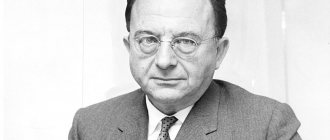Great philosophers talk about what happiness is
Of course, you can spend all your free time watching TV series, but sometimes it seems that something is missing. At such moments, it is worth turning to the wisdom of the greatest thinkers: Kierkegaard, Socrates, Thoreau and Buddha. After all, philosophers were studying happiness long before orange became the new color of the season.
“There is no path to happiness, happiness is the way,” Gautama Buddha, circa 500 BC. e.
The happiest people are those who find pleasure in life itself, and not in one goal or another. Actually, there is no goal. According to Buddha, happiness is on the way.
“Of all forms of prudence, prudence in love is perhaps the most destructive of true happiness,” Bertrand Russell, early 19th century.
For a man like Bertrand Russell, a lover of mathematics, science and logic, immersion in happiness is not very typical.
Quotes from philosophers about happiness
What is happiness? Ask several people and each of them will give a different answer from the others. There is nothing surprising in this, given that we all develop completely different value systems throughout our lives.
Nevertheless, the topic of happiness has always interested great thinkers. Would you like to know their opinion on this matter? Take your time to look for relevant works. All you need to do is explore our collection of philosopher quotes on happiness. Many of them will make you look at familiar things differently.
Happiness is when you are understood, great happiness is when you are loved, real happiness is when you love. Confucius.
Be happy in this moment. This moment is your life. Omar Khayyam.
You will never be happy if you keep looking for what happiness is. And you will never live if you are looking for the meaning of life. Albert Camus.
Thinking that someone else can make you happy or unhappy is simply ridiculous. Buddha.
The real value of happiness is learned only when it has already disappeared. Daniel Zanders.
Only making your childhood dreams come true can bring happiness. Freud Sigmund.
When you appreciate what you have, and not live in search of ideals, then you will truly become happy. Friedrich Nietzsche.
One of the main signs of happiness and harmony is the complete absence of the need to prove something to anyone. Nelson Mandela.
I am becoming more and more convinced that our happiness depends much more on how we meet the events of our lives than on the nature of the events themselves. A. Humboldt.
Happiness is a function of accepting what exists. Werner Erhard.
Happiness is not something ready-made. It comes from your own actions. Dalai Lama.
PHILOSOPHY
F. Nietzsche believed that a wise person does not have to be happy: if a person knows why he lives, it does not matter to him how he lives. But to most people, especially at a young age, such reasoning will seem too harsh, too pessimistic. How can there be no happiness when every day brings so much joy? And how many such joys, how much happiness awaits us ahead!No one, of course, knows exactly what happiness is, and different people understand it differently. The most common view replaces happiness with pleasure. Pleasure is an imitation of happiness. The most extreme type of such illusory happiness is drug intoxication: a person is completely detached from the world, completely dissolved in pure pleasure, he is absolutely happy and contented, and he does not need anything else at the moment. True, then a very severe hangover will come, the person will face severe suffering, but now he does not think about it.
Many people identify happiness with the complete satisfaction of their needs: they have everything, they live richly, physical and spiritual pleasures are easily accessible to them - what else is needed for happiness? There is an old ancient Greek legend that tells how the rich king Croesus asked the sage Solon if Solon had ever seen a happy man. To which Solon replied that he had never seen and in general it was impossible to see a happy person. “But I’m in front of you,” Croesus was indignant, “the happiest, because I’m the richest.” But Solon replied that it was too early to judge this, since Croesus was still alive. Indeed, Croesus was soon attacked by enemies, who defeated and plundered his state and killed him. The Greeks believed that only death gives life a complete form. Life must end, and then you can answer whether a person is happy. And while it continues, this cannot be said.
Some people associate their idea of happiness with a career, primarily a political one: it seems to them that real happiness is having power, managing other people, being visible all the time, listening to cries of approval. But, as life shows, politicians are rarely happy - power quickly corrupts and devastates a person.
Neither oblivion, nor pleasure, nor the satisfaction of all needs, nor power, apparently, bring real happiness; they provide only an imitation of a happy life, after which satiety and disappointment quickly sets in. The sages believed that the only possible type of happiness is living in harmony with oneself, without fear, without vain hopes and dreams, in a calm and clear vision of problems and adversity. Happiness is inner peace when, instead of fear and worries, life is imbued with an understanding of the holiness of every minute lived, the holiness and beauty of the world around us, which are reflected in one’s soul.
Happiness is possible only now, at this moment, in the present. But usually we never linger in the present, argued B. Pascal. We remember the past, we anticipate the future, as if we want to hasten its too slow pace. We are so imprudent that we wander through times inaccessible to us and do not think at all about the only time that belongs to us. We are so frivolous, Pascal believed, that we dream only about imaginary times and, without reasoning, run away from the only thing that exists in reality. This is because the present usually hurts us. We hide it out of sight because it depresses us, and if it pleases us, we regret that it slips away. We are trying to hold it in the future and assume to dispose of things that are by no means in our power, at a time to which we will not necessarily live to see.
“Let everyone,” he urged, “understand their thoughts. He will see that they are all occupied with the past or the future. We hardly think about the present, and if we do, it is only in order to learn how to better manage the future. The present is never our goal. Thus, we never live at all, but we are only going to live and constantly hope for happiness, but we never achieve it, and this is inevitable” [1].
1 Pascal B. Thoughts. P. 90.
Until a person has found anything sacred in his life, has not felt the depth, the exciting beauty of the present moment, his life is superficial. He can get married, have children, a good house and money, he can be smart and lucky. But his life will be deprived of that aroma of wisdom and tranquility, without which everything looks like a shadow.










